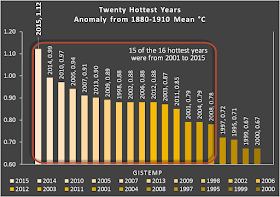But wait, we haven't even had the kids at the door for Halloween yet.
Apparently with two and a half months yet to go, almost a full season, 2016 is said to have "a lock" on becoming the newest in a recent succession of years to become the "Hottest Year on Record."
Anybody see a pattern here?
Gavin Schmidt, director of the NASA Goddard Space Laboratory, tweeted:
With data now available through September, 2016 annual record (~1.25ºC above late 19th C) seems locked in.pic.twitter.com/Btp3Vutakn
I guess that's what you get when 11 of the last 12 consecutive months have set new records.

Around here, kids used to wear ski jackets at Halloween. No more!
ReplyDelete
ReplyDeleteThese steadily accumulating records are a powerful demonstration that what once was is no more and today is highly likely to be eclipsed by what's coming in the near- medium- and long-range.
What we see in these ongoing climate summits is a lack of political will or popular resolve to even arrest this, much less somehow turn it back.
Government, oblivious to the very profound changes in our world over the past 30 years, remains not merely dysfunctional but actually delusional.
Clinging to neoliberalism more than a decade after it was apparent that the grand experiment had failed; the obsessive belief that we must pursue perpetual, exponential growth in a world about to come apart at the seams; waging wars without any means to achieve victory or even any idea of what victory might look like; these and more evidence a critical lack of leadership at the most crucial time in our history.
Today we are administered by technocrats who have little interest in vision. The day of true leadership and statesmanship is gone, perhaps never to return.
The rocks loom ever nearer and there's nobody in the wheelhouse.
Today, we had a humidex of 30, Mound, unheard of for this time of year.
ReplyDeleteWhen I read about conditions like yours, Lorne, my mind keeps turning to "new normal." Then I realize this is just another point in a progression that has years, decades to go and, with each passing year, seemingly becomes more intractable. Not a confidence booster.
ReplyDeleteWarning: global averages do not always show up in local conditions.
ReplyDeleteNor can we make very specific predictions without getting egg on the face. The BC gov predicted that cc means cooler, wetter summers and warmer, wetter winters here. (ugg)
So far I'd say (based on my experience not data) that the BC coast climate has been drier than normal in the past few years. Warmer too? ... not sure.
Currently, the rain has returned to the west coast provoking both relief (we need the water, things are normal) and resentment (love that California weather day-to-day). Continental Canada is seeing more weather anomalies than here on the coast.
As the Arctic warms, the jet stream undulates more than it used to - I believe that the last two winters have been colder than normal for my family in Toronto.
Will we be oblivious 'frogs in a pot as the water slowly heats to boiling' or intelligent agents that can act collectively to survive then thrive?
Time will tell, but so far ....
One telling aspect of GW, NPoV, is the warming of Pacific waters. From California to northern BC, marine species are on the move.
ReplyDeleteCalifornia, which has had a flourishing sardine fishery found the resource suddenly unreliable. A lot of it moved north. Southern sardine and herring stocks have migrated up our way. With the prey fish migration the predators followed. One example is the sudden arrival of large numbers of humpback whales.
I don't know if you're familiar with Fanny Bay but it was always fun to go out there during the annual herring run to catch the arrival of sea lions that migrated from as far away as Alaska and California for the feast. They would mass in Fanny Bay for a week or so and then they would be gone. Now they've become permanent residents, a clear indication that their feed stock is now available to them in large numbers. Victoria now has a resident population of brown pelicans that are established between Victoria harbour and Race Rocks. Terrestrial life is also migrating but not as quickly or unimpeded as marine species.